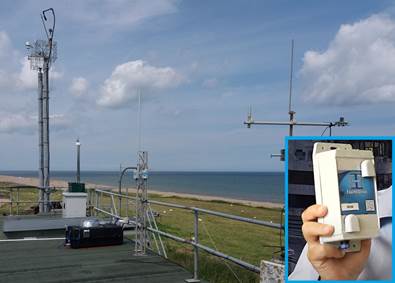Affordable AI-powered air pollution sensors can revolutionise monitoring of air quality, research by Kingston University finds

A new generation of roaming air pollution sensors, powered by artificial intelligence, can improve the accuracy of air quality measurements and better inform people about pollution levels in their area, a new Kingston University research study has found.
image002.jpgThe study, published in MDPI’s Sensors journal, aimed to examine how air quality monitoring could be enhanced by developing and deploying thick mobile phone-sized, cost-effective electrochemical sensors integrated with AI technology that could deliver precise, real-time air quality readings at any location.
Current monitoring systems are expensive, not transportable and too few in number – meaning that pollution level readings from the nearest station often do not reflect the air quality in your immediate surroundings. Air pollution is reported to be responsible for seven million death a year, according to the World Health Organisation, with children especially vulnerable due to developing lungs, a weaker immune system and faster breathing rate.
Initially funded by internal Seedcorn funding, followed by Innovate UK and the UK Shared Prosperity Fund, Kingston University collaborated with Technocomm Consulting Ltd, network communications and sensors experts, which developed an affordable air pollution device called EnviroSense.
Kingston University investigated how the presence of other gases and environmental conditions affects the accuracy of these air sensors. To perform this, the sensors were co-located with those at high-precision reference air quality station Weybourne Atmospheric Observatory (right) on the North Norfolk coast. This location was particularly suitable as it sees a broad spectrum of pollution levels, primarily due to southwesterly winds carrying polluted air from various parts of the UK, including London and the Midlands.
The data was collected from both the smaller, affordable air sensors and the larger monitoring station over a 12-week period, between May and August 2024, with measurements of carbon monoxide (CO), carbon dioxide (CO2) and ozone (O3) collected every 30 minutes. Weather conditions were also monitored to help better understand the complex relationships between different gases, pollutants and environmental conditions.
This data was then fed into advanced AI models which helped to slash measurement inaccuracies by up to 46 per cent, demonstrating that data science had turned flawed, yet promising, sensors into precision tools that can help people seeking cleaner air.
This collaborative effort, recognised by Innovate UK as a success story, has enabled Technocomm Consulting Ltd to update and commercialise a more accurate version of its air pollution device, EnviroSense AI.
Knowledge Exchange and Research Institute Director for Cyber, Engineering and Digital Technologies at Kingston University and co-investigator Professor Jean-Christophe Nebel said the project had offered the opportunity to provide academic knowledge to a company addressing real-world challenges. “We’ve discovered that portable air sensors, powered by AI, give accurate enough data to really make a difference to the public,” he said. “The data has the potential to inform policy decisions and enable emergency measures at local levels to directly contribute to protect the health of the public – revolutionising air quality monitoring and traffic management.”
“Our dream is to have one of these sensors on every bus or refuse collection vehicles visiting every single postcode, and for this to provide easily accessible and highly accurate air pollution data to everyone about where they live or work,” he added.
image004.jpg
Senior lecturer and MSc Data Science course leader and principal-investigator Dr Farzana Rahman said the study was crucial in helping address a major public health issue. “The innovative AI-powered sensors transform air quality monitoring and have made the data more accurate and accessible than ever. This collaboration has not only addressed a critical public health challenge but also set the stage for future advancements and impactful partnerships.”
Managing Director of Technocomm Consulting Ltd Bijan Mohandes said the close collaboration between Kingston University and Technocomm made the project a success. “The regular team meetings with follow-on action items and execution were instrumental in defining the successful outcome of the project on time. The research showed that Machine Learning and AI have a role to play in modelling accurate electrotechnical sensors,” he said.
Further work is currently underway in conjunction with Rey Juan Carlos University in Madrid and a local university in Kuala Lumpur, Malaysia to deploy the affordable air sensors and start collecting data. Such data will test the units and AI technology accuracy in different climates to the UK.




